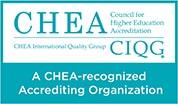About the Accreditation Process
Degree and accreditation mills mislead and harm. In the U.S., degrees and certificates from mills may not be acknowledged by other institutions when students seek to transfer or go to graduate school. Employers may not acknowledge degrees and certificates from degree or diploma mills when providing tuition assistance for continuing education. “Accreditation” from an accreditation mill can mislead students and the public about the quality of an institution. In the presence of degree, diploma and accreditation mills, students may spend a good deal of money and receive neither an education nor a useable credential.
Degree Mills
In order for a respiratory care program to receive accreditation from the Commission on Accreditation for Respiratory Care (CoARC) , it must withstand a formal, structured and comprehensive review of the details of its operations and be deemed in compliance with standards and expectations by a team of experienced evaluators. The multi-month peer-review process culminates with a substantial discussion and analysis by an elected and appointed accrediting Board of Commissioners, comprised of members of the public and member institutions. Only programs that have withstood that level of scrutiny and review are granted accreditation by CoARC and can be deemed “accredited.” There is no short-cut to accreditation nor is it permanent; the certification of quality and integrity is the responsibility of CoARC and may be withdrawn, suspended or revoked at any time for appropriate reasons. All programs must re-apply for accreditation on a regular basis and undergo the same type of review.
Programs and institutions that have not successfully withstood this level of review and scrutiny may fall under the category of “degree mills;” the U.S. Department of Education (www.ed.gov) and the Council for Higher Education Accreditation (www.chea.org) have more detail and definitions about “degree mills” on their websites.
Accreditation Mills
You may also encounter “accreditation mills” − providers of accreditation and quality assurance or operations that offer a certification of quality of programs or institutions that is considered bogus. Not all accrediting agencies are created equally. Like the process utilized by bona fide accrediting organizations to certify the educational quality of colleges and schools, the Commission on Accreditation for Respiratory Care (CoARC) and other bona fide accreditors are subject to standards, expectations and practices applied by third-party peers who are knowledgeable about the discipline of accreditation.
The Department (www.ed.gov) and CHEA (www.CHEA.org) have more detail and definitions about “accreditation mills” on their websites.
Video about Degree Mills and Accreditation Mills
If you suspect a degree mill or accreditation mill is providing respiratory care education, please contact the CoARC Executive Office at (817) 283-2835 ext. 101 or by email at tom@coarc.com.
The Commission on Accreditation for Respiratory Care (CoARC) is the sole nationally recognized authority for the accreditation of first professional degree programs in respiratory care. CoARC’s mission is ensure that high quality educational programs prepare graduates to be competent respiratory therapists with proficiency in practice, education, research, and service.
CoARC and its sponsoring organizations cooperate to establish, maintain, and promote educational standards of quality to prepare individuals for respiratory care advanced practice, and to provide recognition for degree-granting, postsecondary educational programs that meet the minimum requirements outlined in the Accreditation Standards for Entry into Respiratory Care Professional Practice and Accreditation Standards for Degree Advancement Programs.
The accreditation process is voluntary and is initiated only at the request of an institution that meets the criteria for sponsorship as identified in the Standards. The CoARC conducts a comprehensive review of the program relative to these Standards. Accreditation decisions are based on the CoARC’s review of information contained in the accreditation application and self-study report, the report of site visit evaluation teams, the annual report, and any additional requested reports or documents submitted.
Programs that have successfully undergone the review process are granted accreditation status by CoARC, which provides public recognition of achievement. The CoARC Board has final decision-making authority for all accreditation actions.
At its meeting on September 24-25, 2012, the CHEA Board of Directors reviewed the recommendation of the CHEA Committee on Recognition regarding the recognition application submitted by the Commission on Accreditation for Respiratory Care (CoARC). The board of directors accepted the committee’s recommendation and granted recognition for up to ten (10) years to CoARC.
Accreditation is a status that provides assurance to prospective students, their families and the general public that an institution (or a program) meets minimum requirements (i.e., Accreditation Standards) and that there are reasonable grounds to believe the institution (or program) will continue to meet those standards in the future.
- Accreditation is assurance that a respiratory care program meets the quality standards established by the profession.
- Accreditation helps students and their parents choose quality respiratory care programs.
- Accreditation enables employers to recruit graduates they know are well-prepared.
- Accreditation is used by registration, licensure, and certification boards to screen applicants.
Accreditation gives higher education institutions a structured mechanism to assess, evaluate, and improve the quality of their programs.
The Value of US Accreditation document was developed by national and programmatic accrediting organizations and the Council for Higher Education Accreditation (CHEA).
In addition, CHEA has produced three short videos posted on YouTube. They address:
- Accreditation and Its Value to You
- Types of Accreditation: What’s the Difference?
- The Council for Higher Education Accreditation
The videos provide helpful information to anyone with an interest in knowing more about accreditation; each directs viewers to the CHEA Website for more in-depth information.
A brief video about accreditation produced by the Association for Specialized and Professional Accreditors (ASPA).
Find CoARC Accredited Programs
Job Board
Map of Program Outcomes
Program and Personnel Changes
